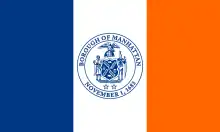James J. Coogan
James Jay Coogan (January 16, 1846 – October 24, 1915) was the borough president of Manhattan, New York from 1899 to 1901, and a successful merchant and real estate manager.[1]
James Jay Coogan | |
|---|---|
 | |
| 2nd Manhattan Borough President | |
| In office January 5, 1899 – December 31, 1901 | |
| Preceded by | Augustus Winniett Peters |
| Succeeded by | Jacob Aaron Cantor |
| Personal details | |
| Born | January 16, 1846 Manhattan, New York City |
| Died | October 24, 1915 (aged 69) Manhattan, New York City |
Biography
Coogan was born on January 16, 1846, in Manhattan, New York City.[1]
Coogan started out as an upholsterer, and opened a furniture store on the Bowery. Through his dealings with furniture laborers, he became known as a friend of the working class, and eventually became friendly with Richard Croker, one of the leaders of Tammany Hall. He was a graduate of New York University School of Law. In 1888, he was nominated by the Urban Labor Party for Mayor of New York City, but came in fourth, and Hugh Grant was elected Mayor.[2] He married Harriet Gertrude Lynch, a daughter of William L. Lynch, who had many real estate holdings in Manhattan, including the land on which the Polo Grounds stood. He managed the properties, and is the source of the Coogan's Bluff and Coogan's Hollow names.[3]
He died of heart disease on October 24, 1915, at the Hotel Netherland in Manhattan, New York.[1] He was buried in Calvary Cemetery in Queens, New York City.
References
- "James J. Coogan Dead. Real Estate Owner Succumbs at the Hotel Netherland". New York Times. October 25, 1915. p. 9. Retrieved 20 November 2016.
- "Result of the City Vote — Cleveland's Plurality is Fifty-Seven Thousand — Hill Receives Several Thousand More Than That, and Tammany Elects Her Whole Local Ticket — The City Vote". New York Times. November 7, 1888. p. 5. Retrieved 20 November 2016.
- "New Borough President — James J. Coogan Elected to Succeed the Late A.W. Peters — His Selection a Surprise — Members of Municipal Assembly Did Not Know for Whom They Were to Vote Until the Last Minute". New York Times. January 6, 1899. p. 12. Retrieved 20 November 2016.
